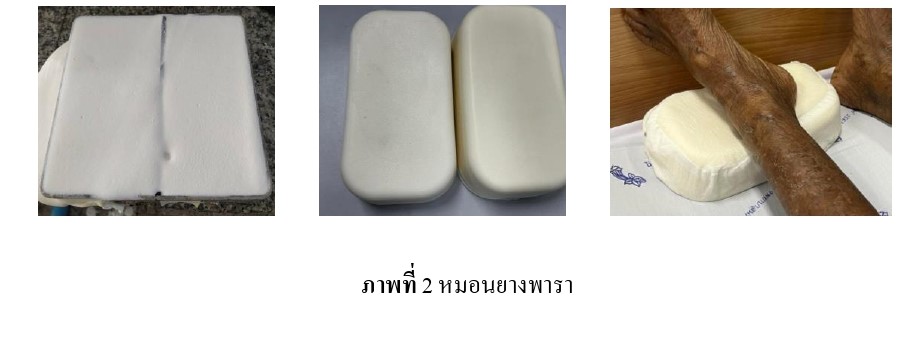Effectiveness of a Latex Pillow on the Incidence of Heel Pressure Ulcers among Bedridden Patients in Naradhiwas Rajanagarindra Hospital
Keywords:
Latex pillow, Prevention, Prevent heel pressure ulcers, Bedridden patientsAbstract
The purpose of this pretest-posttest quasi-experimental study was to determine the effectiveness of a latex pillow on the incidence of heel pressure ulcers among bedridden patients in Naradhiwas Rajanagarindra hospital. Using a purposive sampling technique, 25 bedridden patients from the medical ward of the Naradhiwas Rajanagarindra hospital served as the study's samples. The research instruments were a latex pillow, demographic data questionnaire, a Barthel activities of daily living questionnaire: ADL, a skin assessment tool, and a satisfaction questionnaire using a latex pillow on the incidence of heel pressure ulcers. The satisfaction questionnaire and the skin assessment tool’s content validity index values were.93 and 1, respectively. Alpha's Cronbach coefficient index of satisfaction questionnaire reliability value was.91. The Barthel activities of daily living: ADL, and skin assessment tool had interrater reliability value indexes of 1 and.81, respectively. Descriptive statistics and the Willcoxon Signed Rank Test were utilized in the data analysis. According to the results, the incidence of heel pressure ulcers during three days after utilizing a latex pillow did not differ (Z =.00, p >.05), and the highest degree of sample satisfaction was observed with the latex pillow.
The findings indicate that using a latex pillow in conjunction with heel skin care guidelines can help hospitalized bedridden patients prevent developing pressure ulcers on their heels.
References
Alderden, J., Rondinelli, J., Pepper, G., Cummins, M., & Whitney, J. (2017). Risk factors for pressure injuries among critical care patients: A systematic review. International Journal of Nursing Studies, 71, 97 - 114. https://doi: 10.1016/j.ijnurstu.2017.03.012.
Boonmewiset, W., Sukbua, J., Boonmasri, P., & Nuntana, R. (2022). Development of nursing practice guideline for prevention of pressure sores in intensive care unit, loei hospital. Chaiyaphum Medical Journal, 42(2), 118 - 130. https://thaidj.org/index.php/CMJ/article/view/12825.
Chai-aree, C., & Limjaroen, S. (2020). Effectiveness of implementing clinical nursing practice guidelines for preventing pressure injury at Nakhonpathom Hospital. Region 4-5 Medical Journal, 39(4), 684 - 696. https://he02.tci-thaijo.org/index.php/reg45/article/view/248759
Chuwittayapong, J. (2017). The effect of skin care program combined with water-filled rubber cushion covered with krajud mat on pressure ulcer prevention in bed ridden older adults [Master’s thesis]. Prince of Songkla University.
Cohen, J. (1988). Statistical power analysis for the behavioral sciences (2nd ed.). Erlbaum Associates.
Gefen, A., & Ousey, K. (2020). COVID-19: pressure ulcers, pain and the cytokine storm. Journal Wound Care, 29(10), 540 - 542. https://doi: 10.12968/jowc.2020.29.10.540
Mayi, N., Vachprasit, R., & Sae-Sia, W. (2021). The effect of self-efficacy promoting program on perceived self-efficacy and behaviors in prevention of pressure injury among caregivers and incidence of pressure injury in dependent patients. Journal of Health and Nursing Research, 37(3), 89 - 104. https://he01.tci-thaijo.org/index.php/bcnbangkok/article/view/248333
Maytapattana, M., Dhiranathara, N., Phoythong, P., Kumwarat, N., Chobtodklang, J., Kongmark, T., Ritthidet, W., & Kongcharoen, S. (2021). Effects of a rubber ball pillow innovation for health to prevent pressure sores: A pilot study. Journal of Nursing Science & Health, 45(1), 61 - 74. https://he01.tci-thaijo.org/index.php/nah/article/view/250594
Mikarat, V. (2014). Developing guidelines to prevent pressure ulcers in patients in the ward severely ill patients at Somdej Phra-Yupparat Sawang Daen Din Hospital. Journal of Sakon Nakhon Hospital, 45(2), 135 - 149. ใส่ลิ้งค์เว็บไซต์หรือเลข DOI.
National Pressure Ulcer Advisory Panel. (2014). prevention and treatment of pressure ulcers: clinical practice guideline In emily haesler (Ed.), European Pressure Ulcer Advisory Panel, & Pan Pacific Pressure Injury Alliance (pp. 46 – 81). Osborne Park.
Pattarakantakul, P. (2013). Effects of the tire-bed innovation usage to prevent pressure sore occurrence in at-risk patient. Nursing Journal of the Ministry of Public Health, 22(1), 48 - 60. https://he02.tci-thaijo.org/index.php/tnaph/article/view/4828
Polit, D. F., & Beck, C. T. (2017). Nursing research: generating and assessing evidence for nursing practice (10th ed). Wolters Kluwer Health.
Ricci, J.A., Bayer, L.R. & Orgill, D.P. (2017) Evidencebased medicine:the evaluation and treatment of pressure injuries. Plastic and Reconstructive Surgery. 139(1), 275e – 286e. https://doi: 10.1097/PRS.0000000000002850
Srisatidnarakul, B. (2013). The methodology in nursing research. (5th ed). U&I Intermedia.
Thanakaew, S., & Phichaiphong, S. (2014). development of clinical practice guidelines for pressure sore prevention among male patient surgical ward, Lamphun Hospital. Lanna Public Health Journal, 10(3), 173 - 182. https://he02.tci-thaijo.org/index.php/LPHJ/article/view/168709
Wisutthinan, U., & Fukfon, K. (2016). Effects of clinical practice guidelines for patients with moderateand severe head injury on incidence of pressure ulcer and ventilation associated pneumonia. Journal of Nursing and Health Research, 17(3), 33 – 41. https://he01.tci-thaijo. org/index.php/bcnpy/article/view/72349

Downloads
Published
How to Cite
Issue
Section
License
Copyright (c) 2024 Princess of Naradhiwas University Journal

This work is licensed under a Creative Commons Attribution-NonCommercial-NoDerivatives 4.0 International License.



